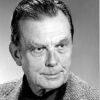Czeslaw Milosz

Czeslaw Milosz
Czesław Miłosz; 30 June 1911 – 14 August 2004) was a Polish poet, prose writer, translator and diplomat. His World War II-era sequence The World is a collection of twenty "naïve" poems. Following the war, he served as Polish cultural attaché in Paris and Washington, D.C., then in 1951 defected to the West. His nonfiction book The Captive Mindbecame a classic of anti-Stalinism. From 1961 to 1998 he was a professor of Slavic Languages and Literatures at the University of...
ProfessionPoet
Date of Birth30 June 1911
CitySeteniai, Lithuania
Czeslaw Milosz quotes about
And if there is no lining to the world? If a thrush on a branch is not a sign, But just a thrush on the branch? If night and day Make no sense following each other?
Under various names, I have praised only you, rivers! You are milk and honey and love and death and dance. From a spring in hidden grottoes, seeping from mossy rocks, Where a goddess pours live water from a pitcher, At clear streams in the meadow, where rills murmur underground, Your race and my race begin, and amazement, and quick passage.
A weak human mercy walks in the corridors of hospitals and is like a half-thawed winter.
When I curse Fate, it's not me, but the earth in me.
When I die, I will see the lining of the world. The other side, beyond bird, mountain, sunset.
If I am all mankind, are they themselves without me?
I liked beaches, swimming pools, and clinics for there they were the bone of my bone, flesh of my flesh. I pitied them and myself, but this will not protect me. The word and the thought are over.
Leaves glowing in the sun, zealous hum of bumblebees, From afar, from somewhere beyond the river, echoes of lingering voices And the unhurried sounds of a hammer gave joy not only to me. Before the five senses were opened, and earlier than any beginning They waited, ready, for all those who would call themselves mortals, So that they might praise, as I do, life, that is, happiness.
The partition separating life from death is so tenuous. The unbelievable fragility of our organism suggests a vision on a screen: a kind of mist condenses itself into a human shape, lasts a moment and scatters.
You see how I try To reach with words What matters most And how I fail.
Irony is the glory of slaves.
All of us yearn for the highest wisdom, but we have to rely on ourselves in the end.
It is sweet to think I was a companion in an expedition that never ends
He returns years later, has no demands. He wants only one, most precious thing: To see, purely and simply, without name, Without expectations, fears, or hopes, At the edge where there is no I or not-I.